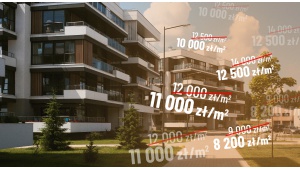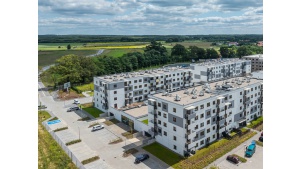The economic situation favors hotels, but investment remains limited
Prestige PR
Włodarzewska 81C lok 81
02-393 Warszawa
i.wisniewska|prestigepr.pl| |i.wisniewska|prestigepr.pl
508 927 958
www.prestigepr.pl
Katarzyna Tencza, Transaction Director at Walter Herz
The value of investment transactions in all real estate market sectors, both in Poland and Europe, still significantly deviates from the scale of investments recorded before the outbreak of the pandemic. Nonetheless, last year saw the first signs of recovery in the hotel segment. The sale of the hotel part of The Warsaw Hub by Ghelamco signaled a return to investing international capital in the Polish market. In October last year, the Crown Plaza and Holiday Inn Express hotels were acquired by the French investment fund Corum. 2023 saw a total of four transactions, partially carried out by Polish investment entities, contributing to investments totaling around EUR 83 million in this sector. In the first months of the current year, two hotels along the Baltic Sea changed hands.
The increased interest of investors in hotels is a result of the improvement of the industry's shape. The return of hotels to the growth trajectory and the anticipated decrease in the cost of capital may lead to a higher number of acquisitions in this market in the near future. However, due to significant disparities in price expectations between buyers and sellers currently, I wouldn't expect drastic changes in this area in the short term. In the upcoming months, we will most likely continue observing the finalization of individual transactions. A more pronounced revival in transactions is expected probably within the next 12-18 months.
The Bull Market Returns
On the other hand, the hotel sector can showcase excellent operational results. Despite a challenging geopolitical environment and macroeconomic conditions, the hotel market in Poland and the CEE region has once again entered a growth phase. Last year, hotels operating in the Polish market returned to pre-pandemic levels of performance and, in some cases, even improved them.
In 2023, according to data from STR Global, hotels in Poland saw a 21 percent increase in average revenue per available room (RevPAR) compared to the previous year and an 18 percent higher RevPAR compared to 2019. Poland had the highest growth in this indicator in the CEE region compared to the pre-pandemic period.
Warsaw emerged as the local growth leader with a 73 percent average occupancy rate. Last year, the Warsaw hotel market recorded the highest occupancy rate in the CEE region, surpassing even the European average of 69 percent. Warsaw maintained its position in the top 10 European hotel markets with the highest occupancy growth.
Last year, hotels operating in Warsaw achieved a 21 percent year-on-year increase in RevPAR and a 26 percent increase compared to 2019 results. The demand from individual tourist guests also increased in the capital market, with average room rates up by 25 percent compared to 2019.
The Return of Tourists
A promising sign for hoteliers is the return of tourists to Poland. In the first half of last year, passenger traffic at Polish airports exceeded levels seen in early 2019. Poland, offering a significant number of interesting tourist destinations, both urban and resort areas, is becoming a highly attractive country in the CEE region for hotel operators. Driven by the growing popularity of our country among tourists, we're witnessing announcements of new hotel investments, including those located near airports, such as the construction of a Campanile Premiere Classe hotel with 400 rooms near Warsaw Chopin Airport.
Current hotel chains in Poland and operators from Western Europe and America are interested in further investing in our market. For instance, the international brand B&B Hotels has announced its expansion plans based on mixed-use projects. We are also on the radar of new investors.
When it comes to urban hotels, the focus is primarily on seeking attractive locations in Warsaw and Cracow. Investors are focusing mainly on central areas, which are considered safe due to the diverse group of guests who stay in such establishments.
Challenges
Key to the development of the hotel market is the cost of investment financing and access to credit. Additionally, difficulties arise in the selection of suitable personnel and in the optimal management of revenue structures and rising operational costs of properties. High inflation affects the growth of current expenses, which even with high hotel occupancy rates, reduces the real profits.
Despite the excellent results recorded by the sector, hoteliers' investment enthusiasm is dampened by high construction costs. The development of investments is hindered by limited access to financing by banks. The industry is awaiting an easing of investment financing conditions. Currently, we can already observe some revival in this aspect compared to previous years when only a few hotel projects enjoyed satisfactory financing terms.
In recent times, the skeptical approach of banks towards sector investments has inclined investors to seek alternative ways to execute projects through condo systems and second home investments. There is a growing interest from various market players, including developers who have not previously been active in this segment, in such ventures. The fastest developing area in Poland in this regard is the western coastal strip. Condohotels and holiday apartments are also increasing in popularity in Zakopane, Karpacz, and the Beskidy Mountains.
ESG
The opportunity to reduce operational costs and the necessity to adapt properties to EU ESG criteria are prompting an increasing number of entities operating in the hotel market to prepare for building modernization and the implementation of new technological solutions. This is also significant as an evaluation criterion in the decision-making processes of investors and financing institutions. Polski Holding Hotelowy and the Louvre Hotels Group, among others, have already announced modernization works in their hotels.
In terms of modernity of resources, the Polish hotel market is positioned favorably compared to Europe. The development of the hotel infrastructure in Poland in recent years has resulted in the national tourist base being largely adapted to required standards. Warsaw ranks in the top ten largest European markets in terms of the proportion of hotels with ecological certificates, which stands at around 10 percent in the capital market. In the CEE region, Poland is a leader in the number of hotels with BREEAM or LEED certificates.

Łotewski producent wysokiej jakości domów prefabrykowanych wchodzi na polski rynek

Deweloperzy ukrywają ceny mieszkań. Z troski o klientów czy swoje portfele?

Więcej przestrzeni, mniej hałasu – dlaczego Polacy coraz częściej wybierają przedmieścia?
Więcej ważnych informacji
 Jedynka Newserii
Jedynka Newserii

 Jedynka Newserii
Jedynka Newserii

Polityka

Polska może się stać Doliną Krzemową Europy. Potrzeba jednak wsparcia finansowego start-upów i mocniejszej deregulacji
Polskie start-upy skoncentrowane są głównie na rozwoju nowoczesnych technologii informatycznych i cyfrowych. Wyraźny nacisk na oprogramowanie i aplikacje oraz big data i data science wskazuje na silne zainteresowanie narzędziami analitycznymi i rozwiązaniami wspierającymi transformację cyfrową w różnych branżach – wynika z raportu „Rynek start-upów w Polsce. Trendy technologiczne”, który został opracowany w 2024 roku w MRiT. Zdaniem europarlamentarzystów Polska ma szansę się stać Doliną Krzemową, jednak rozwój start-upów blokowany jest m.in. przez ograniczony dostęp do finansowania oraz niekorzystne i nadmierne regulacje.
Transport
Na półmetku wakacji ceny paliw na stacjach nie powinny się wyraźnie zmienić. Znaczące różnice między regionami i stacjami

W sierpniu ceny benzyny, oleju napędowego i autogazu powinny pozostać na poziomach z lipca – uważa ekspertka rynku z firmy Reflex. Wyższe będą zawsze na stacjach premium, tych, które oferują bogatszą ofertę dodatkową, promocje dla uczestników programu lojalnościowego, oraz w regionach, w których tradycyjnie paliwa są droższe ze względu np. na wyższą siłę nabywczą mieszkańców. Różnice mogą sięgać kilkudziesięciu groszy na litrze. Obszary, wokół których te wartości oscylują, zależą z kolei od sytuacji globalnej. Warto patrzeć na sytuację na Bliskim Wschodzie i w Ukrainie.
Polityka
A. Mularczyk (PiS): Nawiązanie poważnego dialogu z Niemcami jest konieczne nie tylko w kontekście reparacji. Powinien być podpisany traktat polsko-niemiecki

– Nie wystarczy jednorazowy gest czy inicjatywa. To musi być podjęcie dialogu, być może też przygotowanie nowej umowy bilateralnej, nowego traktatu polsko-niemieckiego, który regulowałby wszystkie obszary, które wynikały ze skutków II wojny światowej – mówi Arkadiusz Mularczyk, poseł do Parlamentu Europejskiego z PiS-u. Podkreśla, że proces ten nie będzie łatwy, bo wymaga konsekwencji i stanowczości, ale widzi szansę w prezydenturze Karola Nawrockiego, który już zadeklarował kontynuację starań w tym zakresie. Zdaniem europosła wsparciem w polsko-niemieckim dialogu może być administracja Donalda Trumpa.
Partner serwisu
Szkolenia

Akademia Newserii
Akademia Newserii to projekt, w ramach którego najlepsi polscy dziennikarze biznesowi, giełdowi oraz lifestylowi, a także szkoleniowcy z wieloletnim doświadczeniem dzielą się swoją wiedzą nt. pracy z mediami.




![Nestlé w Polsce podsumowuje wpływ na krajową gospodarkę. Firma wygenerowała 0,6 proc. polskiego PKB [DEPESZA]](https://www.newseria.pl/files/1097841585/fabryka-nesquik_1,w_85,r_png,_small.png)




.gif)

 |
| |
| |
|